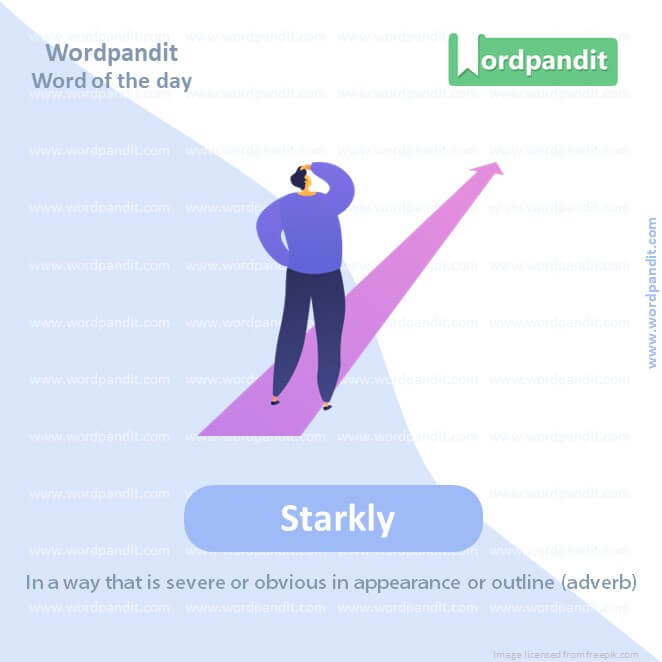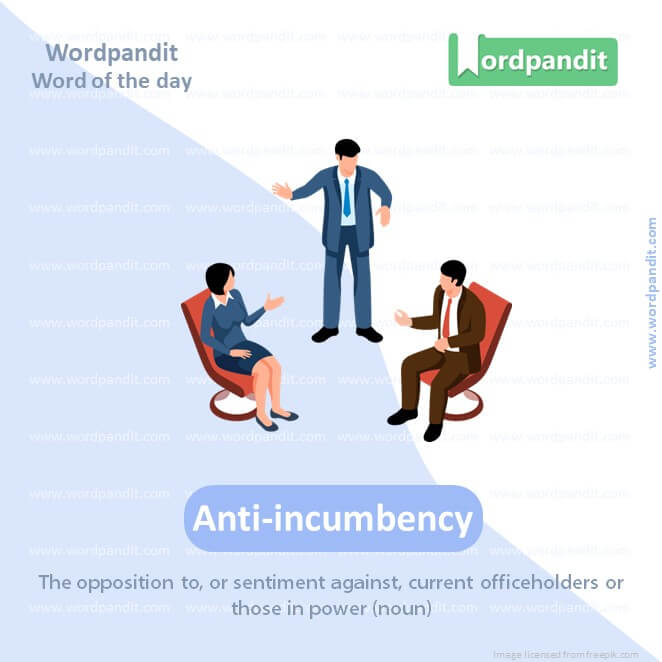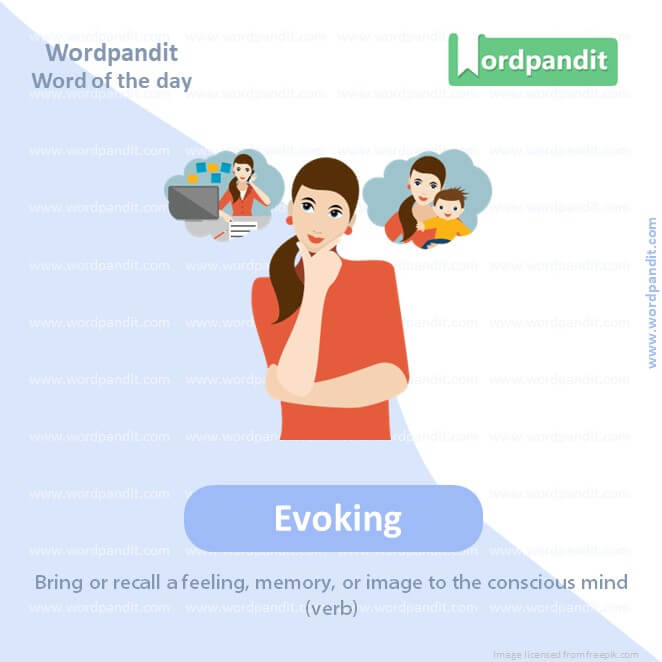Daily Vocabulary Words: List of Daily Used Words
Hi there. Welcome to this special section @ Wordpandit.
Our endeavour here is straightforward: highlighting important daily vocabulary words, you would encounter in The Hindu. This is your repository of commonly used words; essentially, we are posting a list of daily used words. Hence, this has significant practical application as it teaches you words that are commonly used in a leading publication such as The Hindu.
Visit the website daily to learn words from The Hindu.

WORD-1: Starkly
CONTEXT: They differ starkly in the Human Development Index, education levels, and socio-economic indicators.
SOURCE: THE HINDU
EXPLANATORY PARAGRAPH: Starkly means something is really clear and easy to see, like when you can see your shadow on the ground because the sun is so bright.
MEANING: In a way that is severe or obvious in appearance or outline (adverb).
PRONUNCIATION: STAHRK-lee
SYNONYMS: Clearly, Sharply, Plainly, Blatantly, Distinctly
USAGE EXAMPLES:
1. The colors of the painting stood out starkly against the white wall.
2. The two opinions were starkly different.
3. His emotions were starkly visible on his face.
4. The starkly lit room made it easier to focus on the work.

WORD-2: Anti-incumbency
CONTEXT: the Congress and the BJP to unsettle the BRS, which, despite facing anti-incumbency, still enjoys widespread support.
SOURCE: THE HINDU
EXPLANATORY PARAGRAPH: Anti-incumbency is when people don’t want the same leaders to stay in charge anymore, like when kids decide they want a new captain for their sports team.
MEANING: The opposition to, or sentiment against, current officeholders or those in power (noun).
PRONUNCIATION: AN-tee-in-KUHM-ben-see
SYNONYMS: Opposition, Dissent, Disapproval, Resistance, Contempt
USAGE EXAMPLES:
1. The election results showed a strong anti-incumbency wave.
2. Anti-incumbency sentiments were high among the voters.
3. The party had to fight the anti-incumbency factor in the upcoming elections.
4. Anti-incumbency can influence the outcome of political campaigns.

WORD-3: Murmurs
CONTEXT: It has also somewhat put to rest the murmurs and allegations that there is an ‘understanding’ between the BRS and the BJP in Telangana.
SOURCE: THE HINDU
EXPLANATORY PARAGRAPH: Murmurs are the quiet sounds you make when you talk softly or almost whisper, like when you’re telling a secret to a friend and you don’t want others to hear.
MEANING: Low, indistinct, continuous sounds; to say something in a low, soft, or indistinct voice (noun; verb).
PRONUNCIATION: MUR-murz
SYNONYMS: Whispers, Mumbles, Mutters, Murmuring, Rumors
USAGE EXAMPLES:
1. Murmurs of disagreement filled the room after the announcement.
2. She heard the soft murmurs of the children in the next room.
3. His poem was spoken in murmurs that were soothing to listen to.
4. Murmurs of the wind could be heard through the leaves.

WORD-4: Receded
CONTEXT: This is the time when the southwest monsoon has receded and with it.
SOURCE: THE HINDU
EXPLANATORY PARAGRAPH: Receded is like when the water at the beach slowly moves back away from the sand after coming up close. It’s moving back or getting lower.
MEANING: Go or move back or further away from a previous position (verb).
PRONUNCIATION: rih-SEED-ed
SYNONYMS: Withdrawn, Ebb, Retreat, Subside, Diminish
USAGE EXAMPLES:
1. The floodwaters receded after the heavy rain stopped.
2. His hairline receded more with each passing year.
3. The pain receded after she took the medicine.
4. As the crowd receded, the streets became quiet.

WORD-5: Evoking
CONTEXT: powers are limited to evoking and recommending grades of measures depending on the degree of deterioration in air quality.
SOURCE: THE HINDU
EXPLANATORY PARAGRAPH: Evoking is like making someone remember or feel something without telling them directly, like when the smell of cookies makes you think of your grandma’s house.
MEANING: Bring or recall a feeling, memory, or image to the conscious mind (verb).
PRONUNCIATION: ih-VOH-king
SYNONYMS: Eliciting, Summoning, Inducing, Provoking, Awakening
USAGE EXAMPLES:
1. The music was evoking memories of his childhood.
2. The novel does an excellent job of evoking the atmosphere of the early 1900s.
3. The fragrance of the flowers was evoking springtime.
4. His speech was evoking strong emotions among the listeners.
WORD-6: Inflationary
CONTEXT: Inflationary conditions, which created some instability in the July-September quarter due to a transitory spike in food inflation, have calmed down.
SOURCE: THE HINDU
EXPLANATORY PARAGRAPH: Inflationary is when things start to cost more money than before, like when your favorite candy bar is suddenly more expensive than it was last week.
MEANING: Related to or tending to cause an increase in prices or the amount of money available (adjective).
PRONUNCIATION: in-FLAY-shun-air-ee
SYNONYMS: Expansive, Escalating, Price-raising, Inflating, Surging
USAGE EXAMPLES:
1. The inflationary trend in the economy made it hard to budget.
2. Inflationary pressures can decrease the value of money.
3. The government introduced measures to combat inflationary growth.
4. There was an inflationary impact on the cost of groceries.
WORD-7: Subdued
CONTEXT: In contrast, non-food inflation has been quite subdued, benefitting from lower commodity prices and easing supply chain pressure.
SOURCE: THE HINDU
EXPLANATORY PARAGRAPH: Subdued is when things are quiet and not very bright or colorful, like when it’s cloudy and the playground isn’t as noisy as usual.
MEANING: Quiet and rather reflective or depressed; soft and restrained (adjective).
PRONUNCIATION: suh-BYOOD
SYNONYMS: Muted, Toned down, Low-key, Dimmed, Hushed
USAGE EXAMPLES:
1. The lights were subdued at the dinner party.
2. He spoke in a subdued voice after hearing the sad news.
3. The celebration was subdued due to the recent events.
4. The colors in the painting were subdued but beautiful.
WORD-8: Erratic
CONTEXT: If we overlay this on domestic developments such as the adverse impact of erratic weather on agriculture and the lagged impact of interest rate hikes by the RBI on interest rate-sensitive segments, growth is likely to be moderate in coming quarters.
SOURCE: THE HINDU
EXPLANATORY PARAGRAPH: Erratic means moving or acting in a way that isn’t expected, like when a butterfly flutters in all directions and you don’t know where it will go next.
MEANING: Not even or regular in pattern or movement; unpredictable (adjective).
PRONUNCIATION: ih-RAT-ik
SYNONYMS: Unpredictable, Inconsistent, Irregular, Unstable, Capricious
USAGE EXAMPLES:
1. His erratic behavior made it difficult to understand his needs.
2. The stock market has been erratic this week.
3. Her attendance at school was erratic due to illness.
4. The car’s erratic movements signaled engine trouble.
WORD-9: Divergent
CONTEXT: India’s economic cycles have got synchronized with those of advanced countries, its long-term trend rate of growth follows a divergent path.
SOURCE: THE HINDU
EXPLANATORY PARAGRAPH: Divergent is when two things start to go in different directions, like when two paths in the woods split and you have to choose which one to take.
MEANING: Tending to be different or develop in different directions (adjective).
PRONUNCIATION: dy-VER-junt
SYNONYMS: Different, Dissimilar, Varied, Distinct, Contrasting
USAGE EXAMPLES:
1. The divergent opinions of the committee members led to a long debate.
2. Their paths were divergent after graduation, as they chose different careers.
3. The study showed divergent results from what was expected.
4. Divergent thinking is encouraged in creative endeavors.
WORD-10: Deteriorating
CONTEXT: Recognizing a growing global concern about deteriorating air pollution, the World Health Assembly Resolution 68.8, ‘Health and the environment: Addressing the health impact of air pollution’, was endorsed by 194 member states in 2015.
SOURCE: THE HINDU
EXPLANATORY PARAGRAPH: Deteriorating is when something is getting worse or falling apart, like when an old toy breaks because it’s been used a lot and it’s getting old.
MEANING: Becoming progressively worse (verb).
PRONUNCIATION: dih-TEER-ee-oh-ray-ting
SYNONYMS: Declining, Degenerating, Worsening, Decaying, Degraded
USAGE EXAMPLES:
1. The patient’s health was deteriorating rapidly.
2. The old house was deteriorating without proper care.
3. Her performance at work deteriorated when she lost interest.
4. The weather is deteriorating, and a storm may be coming.
vocabulary upsc
The Union Public Service Commission (UPSC) examination represents a significant milestone for many aspirants across India. Part of the journey to success involves comprehending and utilizing a robust ‘vocabulary UPSC’ that can set competitive exam takers apart from the crowd. Let us delve into the nuances of how this essential resource can be mastered effectively.
For starters, one has to understand the significance of ‘vocabulary UPSC.’ This is much more than rote learning a word list. It’s about understanding the connotations, the nuances, and the context in which these words are used. This understanding can greatly improve not only your comprehension skills but also your performance in the English language section of the The Union Public Service Commission exam.
Following the understanding stage, come practice and revision. ‘Vocabulary UPSC’ learning cannot occur overnight, and it is essential to devote a specified time daily to learn and review new words. Incorporating vocabulary-learning into your daily study habit can help you enhance your linguistic skills and aid in long-term retention.
Another much-needed approach to ‘vocabulary UPSC’ is using the learned words in regular communication. This method reinforces learning and aids retention. Additionally, creating a personal word diary where you note down new words, their meanings, and context can serve as your go-to guide for revision.
One common misconception about ‘vocabulary UPSC’ is that it’s only limited to English. However, it is vital to understand that the concept extends beyond languages. Terms used in subjects like History, Geography, or Economics should also be part of your vocabulary repository. This multifaceted conception can significantly aid in developing a comprehensive understanding of subjects, ultimately resulting in a higher score.
In conclusion, mastering ‘vocabulary UPSC’ requires consistent effort, deep understanding, and practical application. The journey to UPSC success is not just about learning; it’s about knowing how to use your learning effectively. So, embark on this discovery with a clear goal and unwavering dedication, and success will surely be yours.











